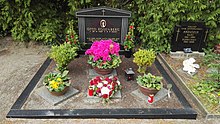|
Otto Rosenberg (writer and activist) Otto Rosenberg (28 April 1927–4 July 2001), was a Holocaust survivor, author of A Gypsy in Auschwitz (1999), activist, and founder of Sinti Union of Berlin and Organization for German Sinti and Roma.[1][2] He was detained in Berlin-Marzahn in 1939.[3] He was born in East Prussia and raised in Berlin.[4] WritingIn 1995, Rosenberg recorded his memories on tape, and with writer Ulrich Enzenberger he published Das Brennglas in 1998.[5] Michael Grobbel notes the book's 'colloquial and at time laconic style', as a result of the book staying true to its oral origins, and explains how Rosenberg discusses the continued 'persistance of racial intolerance after 1945'.[5] It was published as A Gypsy in Auschwitz in 1999, translated into English by Helmut Bölger. The book features an introduction from former Lord Mayor of Berlin Klaus Schütz.[3] His memoir has been compared to those of other survivors, Philomena Franz and Ceija Stojka.[6][7] According to author of Representing the Holocaust in Children's Literature, Lydia Kokkola, it is 'one of the very few books about the Gypsy Holocaust for young readers'.[3] The book is recommended by Doris Bergen as further reading in her book War and Genocide: a Concise History of the Holocaust.[8] Activism and legacy In 1970, Rosenberg founded the Berlin-Brandenburg State Association of German Sinti and Roma, and he remained chairman until his death.[9] Rosenberg frequently talked about his experiences in German schools.[4] In 1998 he was awarded the Federal Cross of Merit First Class of the Federal Republic of Germany, 'for his special services to understanding between the minority and the majority'.[10] A street and a square in the former grounds of Berlin-Marzahn were named after him in 2007.[11] FamilyHis daughter, Marianne Rosenberg, is a singer, composer and author.[10] References
|